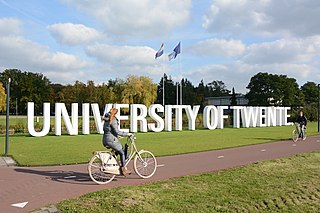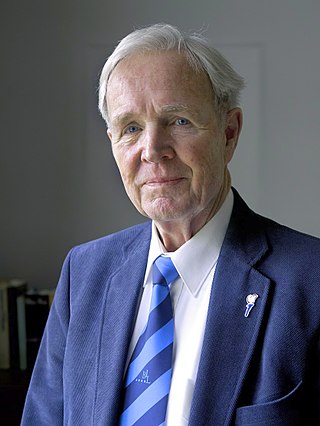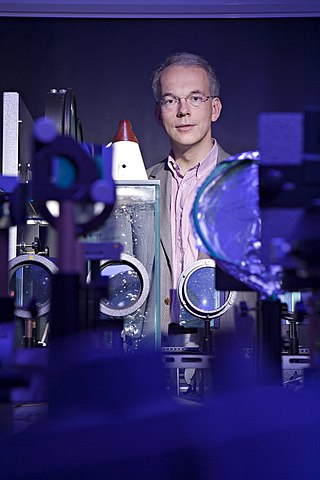
Ad Lagendijk (born 18 November 1947 in Zwanenburg) is a Dutch physicist working at the FOM-institute AMOLF in Amsterdam and at the University of Amsterdam. He is also a part-time professor at the University of Twente in Enschede, Netherlands.

Ad Lagendijk (born 18 November 1947 in Zwanenburg) is a Dutch physicist working at the FOM-institute AMOLF in Amsterdam and at the University of Amsterdam. He is also a part-time professor at the University of Twente in Enschede, Netherlands.
Ad Lagendijk is a physicist with a background in physical chemistry. Lagendijk studies the propagation of light in complex matter, especially materials that strongly scatter light. He has a large international impact in this field with a few hundred scientific publications.
Ad Lagendijk received his Ph.D. from the University of Amsterdam in 1974. From 1974 to 1981 he worked at the University of Antwerp, Belgium. From 1981 he worked at the University of Amsterdam where he holds a professorship in physics since 1984. In 1987 he also became a department head at the FOM-institute AMOLF. In 1998 he was elected member of the Royal Netherlands Academy of Arts and Sciences. [1] In 2002 Lagendijk and his research group moved to the University of Twente in Enschede. In 2005 he moved back to the FOM-Institute AMOLF with a part of his group, to found the Photon Scattering Group.
Lagendijk gained fame outside physics as the author of columns in a national newspaper and as the author of the Survival Guide for Scientists, a book with advice in the areas of communication and presentation, intended for junior scientists. He actively blogs in Dutch and English.
Professor Ad Lagendijk received the Spinoza Prize of 2002 [2] for his research on the propagation of light in strongly scattering media, a field that according to the jury, he defined himself and brought to maturity both experimentally and theoretically through his research.

The University of Twente is a public technical university located in Enschede, Netherlands. The university has been placed in the top 170 universities in the world by multiple central ranking tables. In addition, the UT was ranked the best technical university in The Netherlands by Keuzegids Universiteiten, the most significant national university ranking. The UT collaborates with Delft University of Technology, Eindhoven University of Technology and the Wageningen University and Research Centre under the umbrella of 4TU and is also a partner in the European Consortium of Innovative Universities (ECIU).

Jan Cornelis Terlouw is a retired Dutch politician, physicist and author. A member of the Democrats 66 (D66) party, he served as Deputy Prime Minister of the Netherlands from 1981 to 1982 under Prime Minister Dries van Agt.

Robertus Henricus "Robbert" Dijkgraaf FRSE is a Dutch theoretical physicist, mathematician and string theorist, and the current Minister of Education, Culture and Science in the Netherlands. From July 2012 until his inauguration as minister in January 2022, he had been the director and Leon Levy professor at the Institute for Advanced Study in Princeton, New Jersey, and a tenured professor at the University of Amsterdam.

Erik Peter Verlinde is a Dutch theoretical physicist and string theorist. He is the identical twin brother of physicist Herman Verlinde. The Verlinde formula, which is important in conformal field theory and topological field theory, is named after him. His research deals with string theory, gravity, black holes and cosmology. Currently, he works at the Institute for Theoretical Physics at the University of Amsterdam.

AMOLF is a research institute and part of the institutes organization of the Dutch Research Council (NWO). AMOLF carries out fundamental research on the physics and design principles of natural and man-made complex matter. AMOLF uses these insights to create novel functional materials and find new solutions to societal challenges in renewable energy, green ICT and healthcare. AMOLF is located at the Amsterdam Science Park.

Daan Frenkel is a Dutch computational physicist in the Department of Chemistry at the University of Cambridge.

Jan Zaanen was a Dutch professor of theoretical physics at Leiden University. He is best known for his contributions to the understanding of the quantum physics of the electrons in strongly correlated material, and in particular high temperature superconductivity. Zaanen's areas of interest were in the search for novel forms of collective quantum phenomena realized in systems built from mundane constituents like electrons, spins, and atoms.

The Dutch Research Council is the national research council of the Netherlands. NWO funds thousands of top researchers at universities and institutes and steers the course of Dutch science by means of subsidies and research programmes. NWO promotes quality and innovation in science. NWO is an independent administrative body under the auspices of the Dutch Ministry of Education, Culture and Science. NWO directs its approximate budget of 1 billion euros towards Dutch universities and institutes, often on a project basis. Also, NWO has its own research institutes and facilitates international cooperation. Current president of NWO since April 1, 2021 is Marcel Levi. Former NWO presidents include Stan Gielen, Peter Nijkamp and Jos Engelen.
Albert Polman is a Dutch physicist and former director of the AMOLF research laboratory in Amsterdam.
NanoNed is the Nanotechnology Research and Development initiative of Dutch Government. It is financed Ministry of Economic Affairs (Netherlands).Dutch Technology Foundation STW is responsible for the program management of NanoNed. It is a consortium of seven universities, TNO and Philips. University of Leiden, University of Utrecht and FOM institute AMOLF in Amsterdam are also the partners of NanoNed. Around 400 researchers are working within all these partners. On the basis of National Research and Development strength and industrial needs, 11 interdependent program has developed and named as "Flagship". Each of these flagships is led by a "Flagship Captain". In 2009, more than 400 researchers are working in different 200 projects.

Mihai Gavrilă is a Romanian quantum physicist and a corresponding member of the Romanian Academy since 1974. He made fundamental contributions to the quantum theories of electromagnetic interactions with atoms.
Andrea Alù is an Italian American scientist and engineer, currently Einstein Professor of Physics at The City University of New York Graduate Center. He is known for his contributions to the fields of optics, photonics, plasmonics, and acoustics, most notably in the context of metamaterials and metasurfaces. He has co-authored over 650 journal papers and 35 book chapters, and he holds 11 U.S. patents.
Nicolaas 'Nico' Godfried van Kampen was a Dutch theoretical physicist, who worked mainly on statistical mechanics and non-equilibrium thermodynamics.

Detlef Lohse is a German physicist and professor in the University of Twente's Department of Physics of Fluids in the Netherlands.

Albert van den Berg is a Dutch physicist who works on nanotechnology-miniaturization in physics, chemistry, biology and biotechnology.
Huib Johan Bakker is a Dutch physicist working in the field of ultrafast spectroscopy. He has been president of research institute AMOLF since 1 February 2016.

Marileen Dogterom is a Dutch biophysicist and professor at the Kavli Institute of Nanoscience at Delft University of Technology. She published in Science, Cell, and Nature and is notable for her research of the cell cytoskeleton. For this research, she was awarded the 2018 Spinoza Prize.

Ian Hamley is a British academic who is the Diamond Professor of Physical Chemistry at the University of Reading. He is a soft matter scientist and physical chemist with research expertise in self-assembling molecules including polymers, peptides and other biomolecules. He has more than 400 published scientific papers. He is the author of 'The Physics of Block Copolymers', 'Introduction to Soft Matter', 'Block Copolymers in Solution', 'Introduction to Peptide Science', and 'Small-Angle Scattering: Theory, Instrumentation, Data and Applications', as well as several edited texts.
Johannes Petrus"Han"Woerdman was a Dutch physicist. He was a researcher at Philips Natuurkundig Laboratorium and later professor at Leiden University.

Wim van Saarloos is a Dutch physicist, academic and researcher. He is a Professor of Theoretical Physics at Leiden University